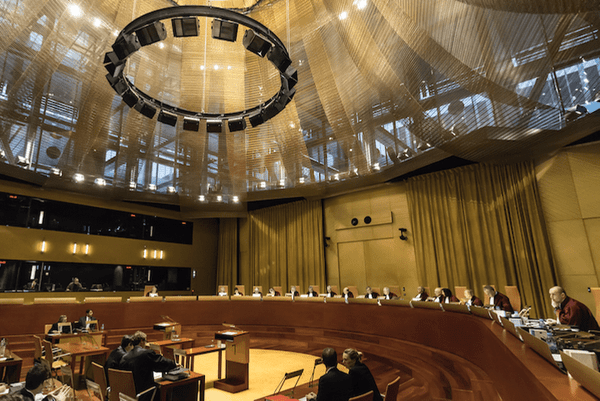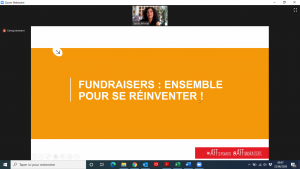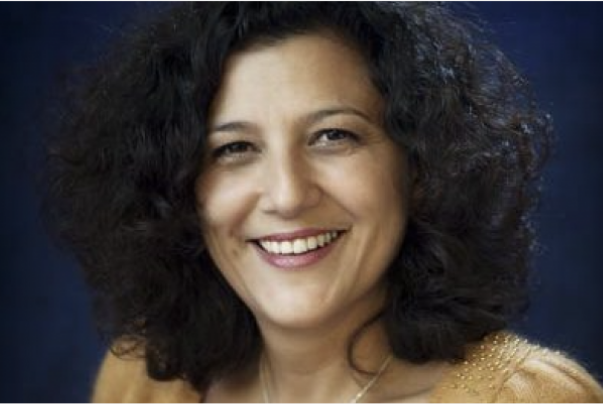
The new agile world of foundations
July 1, 2020
Foreign funding restrictions and anti money laundering: latest developments
August 5, 2020Fundraising Europe interviews Yaële Aferiat, director of the Association Française des Fundraisers about taking its national fundraising conference online for the first time. What has this meant for the association, for its members and for future events?
[Fundraising Europe] Why is the French fundraising conference (Séminaire Francophone de la Collecte de Fonds) such an important part of your annual programme?
[Yaële Aferiat] For almost 20 years, our national conference has been the annual occasion when French fundraisers can get together and learn from one another. Fundamentally, it recognises fundraising as a multi-faceted and meaningful practice and profession, and a personal source of motivation and inspiration.
It’s an opportunity to impart specialist knowledge on all aspects of fundraising – marketing, partnerships, strategy, implementation, sustainability, innovative practices and more. To incentivise and inspire common-good goals such as sustainability, inclusion and access, ethical business practices. And it’s a chance to bridge connections between fundraisers from Paris and other French regions.
Networking can sometimes be overlooked, but the event has played a really important part in uniting and building the fundraising community over the past 20 years.
What was different about this year’s event?
This year, there was even greater need for the event; an opportunity to discuss how we can react and adapt to the ongoing Covid-19 pandemic and other topical fundraising issues, including governmental reform. Of course, we wouldn’t be able to meet in person, so we had to do it all differently and take the event online.
Typically, around 650 people attend over the 3 days, but one of the advantages of going online was that we could cater for an even bigger audience, with 950 fundraisers attending (from all parts of France, Belgium, Canada, Lebanon and the UK). There seemed to be an even greater need and drive for solidarity and togetherness in the fundraising community at a time when everyone had been confined in France.
When did you decide to take the Séminaire online?
In France, confinement began mid-March. We had to cancel our Higher Education conference at the last minute, and we immediately began considering alternatives for other events. The Séminaire was just 3 months away and is a hugely important part of our annual work programme. The idea of taking it online solidified after we ran a series of successful Zoom webinars and consulted our community in order to design the right offer.
But we were concerned about getting the economic model right. People questioned whether delegates would really pay in the same way for digital content. We knew they would – after all, it was the same high level of content. But we had to define the right price. This was one of the most challenging decisions and we may well have been too shy in our pricing. Value for money was very high, particularly when you consider that attendees had the opportunity to follow more sessions that during a traditional event, largely due to the ability to replay missed content. And yet, the economic model was still very successful for us.

What worked particularly well with the event?
We had some concern that some of our partners might be less interested in participating in an online event, but to our great pleasure and somewhat surprise, almost every partner stayed on board, helping to make the event a real success. This truly reflects the trust they placed in us as well as the overall importance of the event, regardless of whether people would attend in person or from their homes. This was a source of relief for us, as well as a reminder of our role in bringing together the French fundraising community and helping it innovate and grow.
Many of our attendees say they come to our annual Séminaire both to learn as well as meet one another. We created Lunch Labs (feauring less formal, topical presentations from our panellists during the lunch breaks) and networking sessions at the end of the day which brought people in need of new connections and opportunities together. The use of the application ConnexMe also helped bring the community together by linking attendees with the panellists and partners through instant messaging, file sharing and social networking.
Perhaps one of the most interesting discoveries was that delegates asked so many questions and these were of great quality, adding to the event far more than we’ve experienced during traditional offline events. We are still in the process of dismantling and understanding everything that unfolded, but we suspect this may come down to people not being under the pressure of asking ‘good’ question in a room full of people.
Rather, they formulated their queries on their keyboard and submitted it through a facilitator. These facilitators helped run each session and lunch lab, alongside a staff members. This meant that our panellists felt very listened to and attendees were able to specify their needs at every turn. This was apparent through feedback on social networks and in the ConnexMe application.
Were any mistakes made along the way?
Undeniably, the mistake we have learned most from has been to trust in our ability to innovate even with such a historic seminar. It can be said that this conference has developed a particular formula throughout the years, with similar outcomes expected each time. Though we are happy with how we were able to meet these expectations despite not being physically together in one place to share knowledge (and drinks), we realise there are many other things we could be capitalising on today, notably digital content.
We are now looking to expand our website and other web services such as those we use to stream or backlog our content for those who wish to revisit it, as well as to invest in taking our events outside of Paris and even into other countries.
What does this mean for your future event programme? Will you be doing more online?
Indeed, the main conclusion so far has been to trust in our ability to provide online content in an organised and productive way beyond what we did before the seminar. The many webinars we offered were free and brought together fundraisers who were so in need of content, but we realise now that we can double down these efforts with rippling positive effects, particularly in these difficult times where the possibility of re-confinement looms over most of us and our European neighbours. We look forward to what we can do next building on this experience. Next year will be the 30 year anniversary of the Association, so we are extremely glad to have learned these things now while turning a new page in our history.
About Yaële Aferiat
Yaële is director of the French Fundraisers Association (AFF) and Global Leader of Giving Tuesday in France. She is dedicated towards development of the fundraising profession and inspiring a culture of philanthropy in France.



